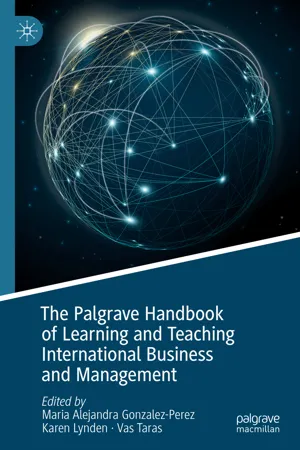- Part I: Introduction: Learning and teaching international business and management using experiential learning pedagogy.
- Part II: Theory-based and conceptual chapters: Learning and teaching international business and management using experiential learning pedagogy.
- Part III: Application-based chapters: Applications of experiential learning pedagogy in international business management learning and teaching. This section offers examples such as:
- Course design
- Class projects
- Capstone projects
- Consulting/corporate challenges
- International competitions
- Partnerships/joint projects with businesses and community
- Arts, culture , and experiential learning in international business
- Online collaborative platforms and global virtual teams
- Study tours and study abroad experiences
- Executive education

The Palgrave Handbook of Learning and Teaching International Business and Management
- English
- ePUB (mobile friendly)
- Available on iOS & Android
The Palgrave Handbook of Learning and Teaching International Business and Management
About This Book
This handbook, which serves as a follow-up text to The Palgrave Handbook of Experiential Learning In International Business, reviews theoretical and empirical approaches of experiential learning pedagogy, and its role in increasing the effectiveness in teaching and learning of international business, and also, in the incorporation of international business-related concepts and competences in business and non-business programs. This edition offers a broader and updated perspective on experiential learning pedagogy for international business and management, and beyond. The first part provides an updated overview of the theories of experiential learning and effectiveness of teaching and learning in international business through the use of experiential learning projects. Part two provides a collection of specific applications of experiential learning in International Business and related fields.
This handbook is a one-stop source for international managers, business educators, and trainers seeking to either select and use an existing experiential learning project or develop new projects and exercises of this kind.
Frequently asked questions
Information
1. Learning and Teaching International Business and Management Using Experiential Learning Pedagogy
Maria Alejandra Gonzalez-Perez
Karen Lynden
Vas Taras
2. Revisiting the Impact of Education Philosophies and Theories in Experiential Learning
Irwyn Shepherd
Table of contents
- Cover
- Front Matter
- Part I. Introduction: Learning and Teaching International Business and Management Using Experiential Learning Pedagogy
- Part II. Theory-Based and Conceptual Chapters: Learning and Teaching International Business and Management Using Experiential Learning Pedagogy
- Part III. Applications of Experiential Learning Pedagogy in International Business Management Learning and Teaching
- Part IV. Class Projects
- Part V. Capstone Projects
- Part VI. Consulting/Corporate Challenges
- Part VII. International Competitions
- Part VIII. Partnerships/Joint Projects with Businesses and Community
- Part IX. Arts, Culture, and Experiential Learning in International Business
- Part X. Simulations, Media and Information Technology in Experiential Learning
- Part XI. Online Collaborative Platforms and Global Virtual Teams
- Part XII. Study Tours and Study Abroad Experiences
- Part XIII. Executive Education
- Back Matter